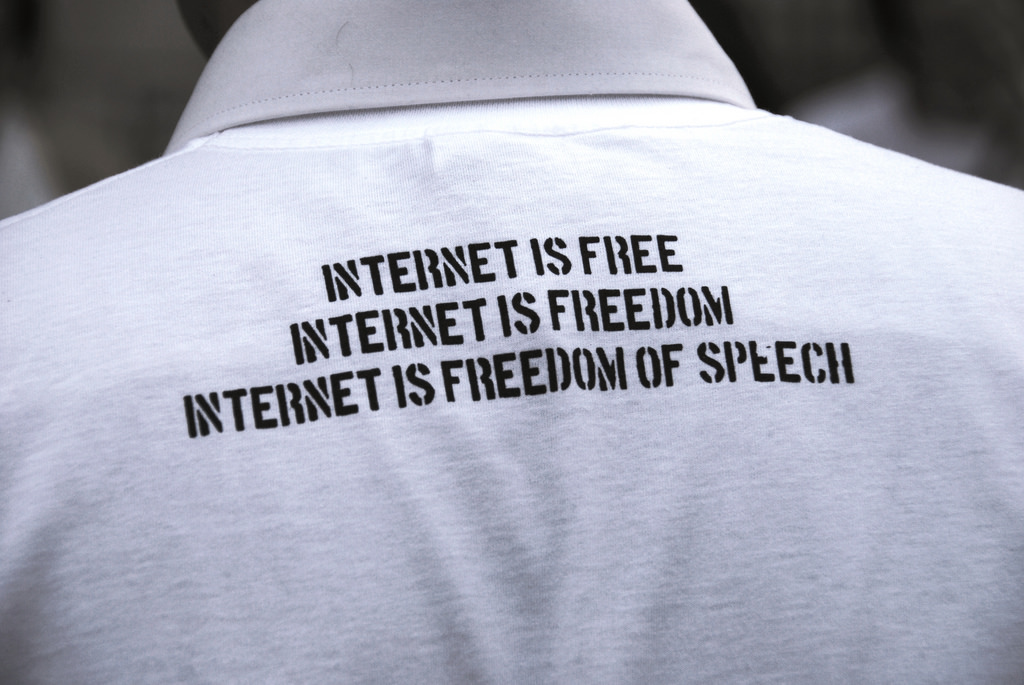Free Speech in the Digital Space
- Charles Opiyo |
- September 3, 2018 |
- Digital Rights,
- Freedom of Expression

A striking postulation of free speech was developed in the 19th Century by John Trenchard and Thomas Gordon, supporters of John Locke. They defined the right as the freedom to “think what you would and speak what you thought”. This placed a strong emphasis on the citizens’ role in exercising the right as against an implied oppressor, the government.
Other postulations of the right intuit that there is a balance to be struck between the right expressed by the citizen and the right of others. Between citizens, the government is charged with ensuring no one infringes the right of another. The overt regulation of speech amounts to the prevention from: holding an opinion, receiving information to facilitate creation of said opinion, or the dissemination of information that would allow the creation of opinions. The state would in this instance curb the spread of information it perceives as undermining its rule or that which infringes the rights of others.
The International Convention on Civil and Political Rights (ICCPR) posits freedom of speech as consisting two parts; a negative obligation on state organs, to deregulate speech and, a positive right, exercised by the public within the law. Subsequently, the right operates within two parameters as well: dissemination of information and expression of opinions that are vital for debate and transparency in democracies; and the censure of statements infringing the rights of others or abrogating order within the state. Two competing norms exist, individual autonomy versus the protection of collective goals, such as equality among persons.
Criticism of other persons should be conducted within the law. Hence, one must respect the rights and reputations of others. Are statements by errant bloggers protected by Kenya’s own free speech clause? Not quite, libellous statements are not granted legal protection. Article 33 of the Constitution of Kenya (CoK) outlaws making of statements that disparage persons and their reputations.
Citizens should be able to oppose decisions made by their government, employer, municipal court or member of parliament. The CoK stipulates that public participation is an essential avenue for citizens to express their sentiments regarding governance. In democracies, elected representatives are not immune from critique. Their actions are scrutinised by a vigilant public, aware of state obligations.
Free Speech: Applicable mutatis mutandis in cyberspace?
Conceptualists of free speech had written their treatises prior to the internet and mass media. Thus, contemporary issues such as jurisdictional conflicts over online offences were unforeseen. Free speech should evolve to meet these demands.
The right should supersede the classic two-party consideration; the government and the citizen. Social media platforms and internet service providers are new participants in the rights matrix. They curate more data than ever before and have the power to deactivate accounts spreading misinformation. While international case law indicates that social media is an arena for free speech, administrators should be obliged to curate the content on their sites and ensure there are no rights infringements.
Kenyan courts applied principles of tort to malfeasance on social media, to regulate the platform. This approach is only partially viable; the “obligation to curate” must be placed on administrators. The main impediment to this concern is practicality. Twitter cannot monitor its 335 million active user’s pages. Surveillance on that scale would broach a myriad of privacy concerns.
A possible solution could be mandating platforms to introduce a complaints system, allowing users to report rights violations. Administrators responding to the report provide initial adjudication on whether the offending content contravenes internal policies. Illegality however, mandates administrators to assist municipal law enforcement with information pertinent to investigations.
Concluding, digital free speech may be defined as:
The freedom to express a factual representation or opinion on an online platform. The right precludes the following: defamatory statements, hate speech, cyber-bullying, or misrepresentations. The custodians of the right include the government and at initial phases, administrators of online platforms. These custodians are obliged to respond expeditiously to any reports of illegal activity or activity flouting platform policies.
